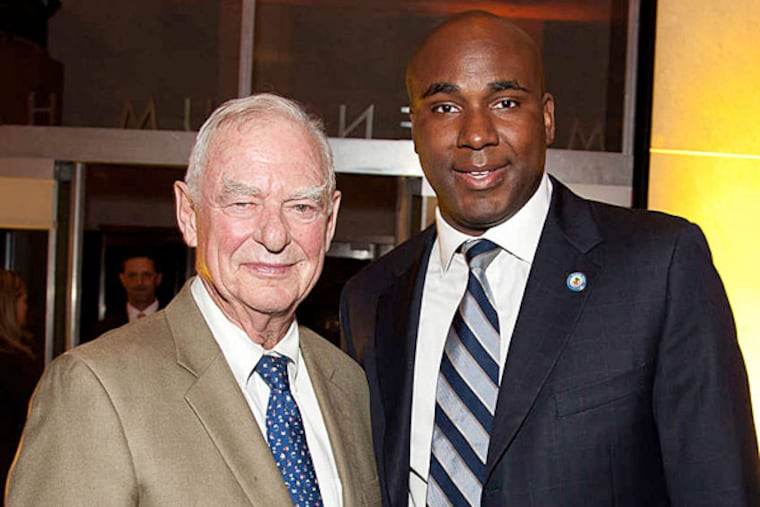Lenfest Foundation maps out a path to its end
The Lenfest Foundation, one of the region's last remaining powerhouse philanthropies, has undertaken a series of changes that will dramatically alter its leadership and mission, and effectively maps out a path to its end.

The Lenfest Foundation, one of the region's last remaining powerhouse philanthropies, has undertaken a series of changes that will dramatically alter its leadership and mission, and effectively maps out a path to its end.
H.F. "Gerry" Lenfest has long said the foundation he and his wife, Marguerite, founded would spend itself down and cease to exist within 10 years of their deaths. But Lenfest, 82, has decided to step down now as chairman. Philadelphia entrepreneur Keith Leaphart, 38, will complete Lenfest's term as chairman through June 2015, heading a new eight-member board on which the Lenfests will remain members.
"We've decided to put the foundation into an independent board of directors, which I no longer control," Lenfest said. "I'm not in ill health. I don't believe in perpetual foundations. We've given away the bulk of our wealth already, and I will have a diminished role in the future. My success in business was finding people who were better at doing things than I was. It's a logical evolution."
Since 2000, the Lenfests have given away slightly more than $1 billion through the foundation and personally, a foundation official said.
New faces around the board table signal programmatic changes, as did the foundation's recent move from a suburban corporate park to slightly smaller downtown offices on Logan Circle. Lenfest has transferred $80 million of personal money into the foundation, which will spend down that principal over the next 15 years on programs to benefit disadvantaged youth, mostly in Philadelphia.
The college scholarship program started in 2002 for students from rural Pennsylvania will continue, spending down $25 million over the next 20 years. The Lenfest Oceans Program, operated with the Pew Charitable Trusts, is slated to receive funding through 2017, then close in 2020.
Lenfest - an owner of Interstate General Media, which publishes The Inquirer - has no current plans to add to the principal of the foundation, whose market value stands at about $100 million, executive director Bruce Melgary said.
With a focus on disadvantaged youth, the foundation is not seeking solicitations to fund other projects. One small exception, outlined in new guidelines to be posted on the foundation's website Monday, are relatively modest "founder's grants," generally between $5,000 and $25,000, though even those "will continue to go primarily to organizations that the foundation has consistently supported in the past," the guidelines state.
The Lenfests' generosity in the area, which started in earnest in 2000 after the sale of Lenfest Communications reaped them $1.2 billion, has always been a mix of personal giving and money directed through the foundation. The Lenfests are among a group of philanthropists worldwide who have committed to distributing all of their wealth to charity.
The changes at the foundation are concurrent with other shifts in the local philanthropic scene. The Annenberg Foundation has moved its focus to California since Leonore Annenberg died in 2009, and the Pew Charitable Trusts has shifted the bulk of its operations to Washington while pursuing a mission more heavily concentrated on research and advocacy on a national level than pure grant-giving.
That leaves the William Penn Foundation and others guided by the Haas family as the largest remaining force in local philanthropy.
For the last decade or so, various combinations of Pew, Lenfest, Annenberg, and William Penn have stepped up to fund large civic projects and take on knotty challenges, such as paying off the Kimmel Center's construction debt.
The Lenfest Foundation - which has made grants and obligations for future grants totaling $210 million since 2000 - contributed to the arts, environmental causes, schools, and museums and other charities in fiscal year 2010-11, according to a recent tax return.
Now, however, it will concentrate on disadvantaged youth in Philadelphia in three areas: early-childhood education, out-of-school time, and career and technical education.
Although the foundation will accept applications from organizations working in those fields, it plans to partner with established programs.
"There's no need to reinvent the wheel," said Leaphart, an osteopath and printing-business chief executive who met Lenfest when Leaphart was considering a run for Congress. He mentioned Drexel University's work in the Mantua neighborhood and Community College of Philadelphia as potential partners.
"I hope we can be a catalyst," Leaphart said.
In addition to Leaphart and the Lenfests, the new board members are vice chairman Joseph F. Huber, Jeffrey Beachell, T. Douglas Hale, Joseph A. Sestak Jr., and Nadya K. Shmavonian.
As for many of the large-scale projects, building additions and other campaigns he has shepherded into existence, personally or through the foundation, Lenfest says he is confident of their continued progress.
"The Philadelphia Museum of Art [he is former board chairman] has a bright future. It plays a vital role in the city; it has 500 volunteers and does terrific work with school kids. Art is something everyone has the capacity to enjoy. Curtis [where he is still chairman] is a wonderful institution, and for what it does it does not have an equal. At the Museum of the American Revolution [whose board he also chairs], we're struggling now to get the last $15 million before we can put a spade in the ground. It'll be a great museum."
But after more than a billion dollars' worth of investment in scores of diverse causes and thousands of groups - including substantial gifts to schools he and his wife once attended - Lenfest said it was time to focus on the home front.
"We felt it was time to put the remaining life of the foundation into disadvantaged youth within the city."